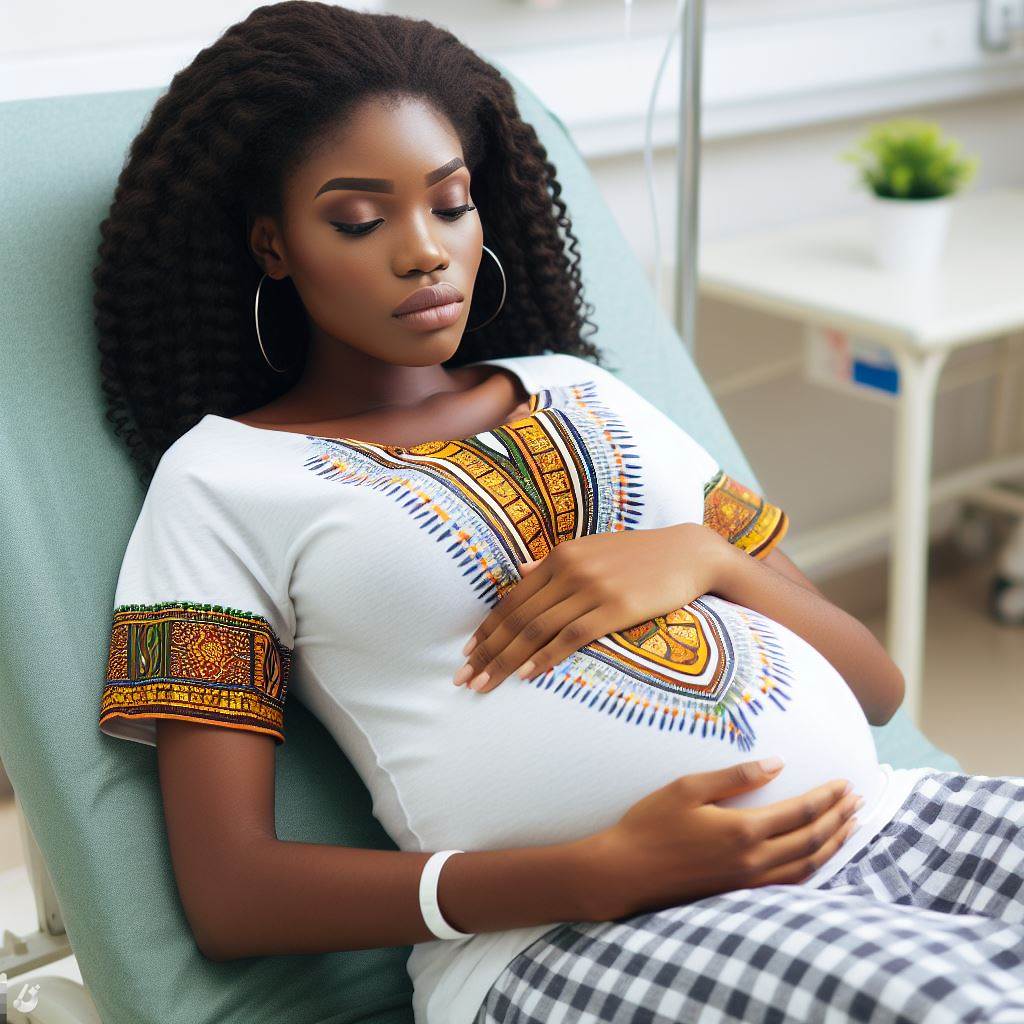Introduction
Week Baby Hearing Develops: In week 16 of pregnancy, the development of the baby’s hearing becomes a significant milestone.
It is important to understand the significance of this development and what to expect during this stage.
A. Importance of Baby’s Hearing Development
The development of a baby’s hearing is crucial as it lays the foundation for their language and communication skills.
Research suggests that babies can hear sounds as early as 18 weeks into pregnancy.
As the baby’s auditory system continues to develop, they start to recognize familiar sounds, such as the mother’s voice and heartbeat.
This early exposure to sounds helps in forming the bond between the baby and the mother.
B. Overview of What to Expect in Week 16
By week 16, the baby’s ears are fully formed and positioned on the sides of their head.
The auditory system is rapidly developing, and the baby becomes more responsive to external stimuli.
During this stage, the baby can hear various sounds both inside and outside the womb.
They may react to loud noises or sudden sounds by moving or kicking.
It is an exciting time to start engaging with the baby using music or gentle speaking.
Parents can also play a role in stimulating their baby’s auditory development by talking, singing, or playing soothing sounds.
These interactions not only support the baby’s hearing but also create a nurturing environment for their overall development.
In fact, week 16 marks an important milestone in the baby’s hearing development.
It is essential to understand the significance of this stage and actively participate in stimulating the baby’s auditory response for their overall growth and well-being.
Parenting Made Just for You
Get personalized Parenting Solutions tailored to your child’s needs. Transform your parenting journey with expert guidance in 1-3 days.
Get StartedBaby’s Hearing Development
During the 16th week of pregnancy, an incredible milestone occurs in the development of a baby’s hearing.
The tiny ears that are forming and evolving inside the womb start to function, opening up a whole new world for the little one.
A. How the ears are forming and evolving
As the inner ear continues to grow and mature, delicate structures called hair cells begin to form.
These hair cells are responsible for converting sound waves into electrical signals that can be interpreted by the brain.
Each week, more of these essential cells develop, enhancing the baby’s ability to hear.
It’s fascinating to think about how the ears are forming and evolving during this crucial stage.
The external part, known as the pinna or auricle, is the visible portion of the ear.
As the weeks go by, it gradually takes shape, assuming its characteristic appearance.
Simultaneously, the middle ear, consisting of the eardrum and three tiny bones called ossicles, is also developing.
The eardrum, a thin membrane, vibrates in response to sound waves, while the ossicles transmit these vibrations to the inner ear.
This intricate system is vital for hearing, and its progress is an exciting part of the baby’s development.
Around the 16th week, the baby’s hearing becomes even more significant as it starts to perceive sounds from the outside world.
The first sounds they encounter are typically the rhythmic beat of their mother’s heart and the soothing sound of her voice.
These familiar and comforting sounds can have a calming effect on the baby, promoting a stronger bond between mother and child.
Unveil the Perfect Name that Tells Your Family's Story
Let us help you find a name that embodies your family's values, traditions, and dreams. Our personalized consultation weaves cultural insights to create a name that's uniquely yours.
Get StartedB. How baby starts to hear sounds from the outside world
At this stage, the baby’s ability to hear is still limited, but it continues to develop rapidly.
They can perceive muffled sounds and distinguish between high and low frequencies.
They may respond to sudden loud noises by displaying a startle reflex or heightened activity.
It’s important for expectant mothers and their partners to engage in activities that stimulate the baby’s auditory system.
Talking, reading, and singing to the baby are all wonderful ways to establish a connection and encourage their emerging hearing abilities.
Playing soft music or ambient sounds can also have a positive impact, creating a soothing environment for the growing baby.
This auditory stimulation helps to foster healthy brain development and establishes a strong foundation for future language and communication skills.
As the weeks progress, the baby’s hearing will continue to advance, allowing them to recognize and respond to even more sounds.
By the time they are born, their auditory system will be well-developed, giving them the ability to hear and respond to their surroundings.
In short, the 16th week of pregnancy is a remarkable time when the baby’s hearing begins to develop.
The ears form and evolve, while the ability to perceive sounds from the outside world emerges.
Engaging in activities that promote auditory stimulation can enhance the baby’s development and strengthen the bond between parent and child.
This incredible journey of hearing development is truly awe-inspiring and highlights the marvels of human life.
Read: Backache & Pregnancy: What to Know
Baby’s Hearing Blossoms
In the magical journey of pregnancy, week 16 marks a pivotal milestone in your baby’s development – the emergence of a heightened sense of hearing.
As the tiny ears continue to evolve, your little one begins to react to the symphony of sounds within the womb.
A. Milestones in Week 16
The 16th week of pregnancy unveils an array of milestones, and among them, the development of the auditory system takes center stage.
The intricate network of nerves and cells within the ears allows your baby to perceive a wider range of sounds, setting the stage for a world of auditory exploration outside the womb.
B. Baby’s Reactions to Different Sounds
It’s fascinating to observe how your baby responds to various sounds at this stage.
While the gentle lullabies you play may evoke a sense of calm, sudden noises might elicit a startle response.
The delicate symphony within the womb becomes a source of comfort, laying the foundation for your baby’s evolving relationship with the auditory world.
C. Recognizing Familiar Voices and Sounds
In this week, the baby’s ability to discern familiar voices and sounds begins to emerge.
The comforting cadence of your voice becomes a source of reassurance for your little one.
Studies suggest that babies can recognize and respond to their mother’s voice, fostering a bond that transcends the confines of the womb.
D. Startling Response to Loud Noises
As the auditory senses sharpen, your baby might exhibit a startle response to loud noises.
This reflex is a testament to the developing nervous system, preparing your little one for the myriad of sensations awaiting in the external world.
It’s a poignant reminder of the intricate dance between the baby’s growth and the protective cocoon of the womb.
In week 16, the symphony of your baby’s development crescendos with the maturation of the auditory system.
As you savor these precious moments, consider playing gentle melodies and speaking soothing words to nurture the burgeoning connection between you and your little one.
The world is about to become a more vibrant place, filled with the beautiful sounds your baby is beginning to discover.
Read: Pregnancy Signs: When to Take a Test
Ways to Stimulate Baby’s Hearing Development
A. Talking to the baby frequently
Babies are born with the ability to hear, but their auditory system continues to develop after birth.
By stimulating their hearing, parents can aid in their baby’s overall development.
Here are some effective ways to promote baby’s hearing development.
First and foremost, talking to the baby frequently is essential.
Parents should engage in conversations with their little ones, even if they may not yet understand the words.
Regularly narrating daily activities and describing the surroundings can significantly contribute to speech development.
This boosts their auditory processing skills and encourages them to communicate.
B. Engaging in interactive activities involving sounds
Additionally, interactive activities involving sounds have proven to be powerful stimuli for hearing development.
Parents can use toys or objects that produce different sounds, such as rattles or musical instruments.
The contrasting sounds capture the baby’s attention and enable them to distinguish between various noises.
This activity enhances their auditory discrimination skills, which are crucial for language development.
C. Playing soft music or nursery rhymes
Music plays a vital role in stimulating a baby’s hearing.
By playing soft music or nursery rhymes, parents can expose their baby to different genres, rhythms, and melodies.
Whether it’s classical, jazz, or lullabies, music helps babies develop a sense of rhythm and pitch.
This exposure supports their auditory perception and enriches their overall auditory experiences.
Moreover, reading aloud to babies is an excellent way to promote their hearing development.
Choose books with rhythmic or rhyming patterns to make it more engaging.
The repetitive sounds in these books help babies recognize patterns and develop their auditory memory.
Reading aloud also provides a bonding experience and enhances the parent-infant relationship.
Using household items to create sounds is another effective technique.
For instance, parents can allow their baby to explore pots and pans, creating different noises by tapping on them gently.
This not only encourages curiosity but also strengthens their listening skills. Be cautious while using these objects to ensure the baby’s safety.
D. Introduce the baby to natural sounds
Another beneficial method is to introduce the baby to natural sounds.
Take the baby for walks in parks or spend time in nature, where they can hear birds chirping, leaves rustling, or water flowing.
These sounds provide a rich auditory experience, promoting their hearing development.
Incorporating sign language in daily interactions with the baby is also advantageous.
Simple gestures, such as waving or pointing, accompanied by spoken words, reinforce their understanding and association between sounds and actions.
This enhances their communication skills and facilitates language learning.
Lastly, creating a calm and quiet environment is crucial for a baby’s hearing development.
Excessive noise and loud sounds can be overwhelming and may hinder their ability to process auditory information effectively.
Ensure that the surroundings are peaceful, especially during sleep time, to provide an optimal listening environment for the baby.
Essentially, there are numerous ways to stimulate a baby’s hearing development.
Talking to the baby frequently, engaging in interactive activities involving sounds, playing soft music, and incorporating various sounds into daily routines are all effective methods.
By implementing these strategies, parents can foster their baby’s auditory skills and support their overall development.
Read: Week 15: Feeling Baby’s Movement

Discover More: Week 9: Baby’s First Movements
Creating a Safe and Serene Environment for the Baby’s Hearing Development
As your little one enters the 16th week of life, their sensory world is expanding, and one crucial aspect of development is their hearing.
Creating a safe and serene environment is pivotal for optimal hearing development.
Let’s delve into the importance of minimizing loud noises, setting up a peaceful sleeping area, and ensuring a calm atmosphere during playtime.
Babies are highly receptive to their surroundings, and a peaceful atmosphere is vital for their auditory growth.
Minimize exposure to loud noises, as prolonged exposure can hinder hearing development.
Opt for soft, soothing sounds and gentle lullabies to create a positive auditory environment.
A. Importance of Minimizing Loud Noises
Loud noises can be overwhelming for a baby’s delicate ears.
Excessive exposure to noise can potentially damage their hearing and hinder developmental milestones.
Ensure that your baby’s environment is free from sudden, jarring sounds.
When engaging in activities that generate noise, consider using ear protection to shield their sensitive ears.
B. Tips for Setting Up a Peaceful Sleeping Area
A restful night’s sleep is crucial for a baby’s overall development, including their hearing.
Create a tranquil sleeping environment by choosing a comfortable crib in a quiet corner.
Use soft, breathable bedding and consider white noise machines to drown out any disruptive sounds.
Ensure the room is adequately dark for an undisturbed sleep experience.
C. Ensuring a Calm and Soothing Atmosphere During Playtime
Playtime is not just about fun; it’s an opportunity for sensory exploration.
Opt for toys that produce gentle sounds, promoting auditory stimulation without overwhelming your baby.
Choose a play area away from noisy appliances and electronics.
Engage in activities that involve soothing music or your gentle voice to create a positive association with sound.
In essence, week 16 marks a crucial phase in your baby’s hearing development.
By creating a safe, serene environment, minimizing loud noises, and setting up peaceful sleeping and play areas, you’re fostering an optimal auditory environment for your little one’s growth and well-being.
Read: Mood Swings in Pregnancy: What’s Normal?
Monitoring Baby’s Hearing Milestones
In the captivating journey of your baby’s development, Week 16 marks a pivotal moment as your little one’s hearing abilities begin to blossom.
Understanding and monitoring these auditory milestones is crucial for ensuring your baby’s overall well-being.
Here’s a guide to help you navigate through this fascinating phase.
At Week 16, your baby’s ears are fine-tuning themselves to the symphony of sounds around them.
It’s essential to observe how your little one responds to auditory stimuli.
Note whether they turn their head toward familiar sounds or react to your voice.
These early reactions are building blocks for their communication skills.
A. Keeping Track of Baby’s Response to Sounds
Create a soundscape for your baby that includes a variety of noises – gentle music, your soothing voice, or the ambient sounds of daily life.
Watch for your baby’s reactions and expressions when exposed to different sounds.
Positive responses indicate healthy auditory development.
B. Consulting a Healthcare Professional
If you notice any irregularities or if your baby seems unresponsive to sounds, don’t hesitate to consult a healthcare professional.
Early intervention can make a significant difference in addressing potential hearing issues.
Pediatricians and audiologists are valuable resources for guidance and evaluation.
C. Recommended Hearing Tests or Evaluations
Regular check-ups are crucial during this period. Pediatricians may recommend hearing tests or evaluations to ensure your baby’s auditory system is developing as expected.
These tests can include otoacoustic emissions (OAE) or auditory brainstem response (ABR) tests, providing insights into the inner workings of your baby’s ears.
In a nutshell, Week 16 is a pivotal moment in your baby’s hearing development.
By actively monitoring their responses to sounds, keeping track of milestones, and seeking professional advice when needed, you’re contributing to a soundscape that will shape their world.
As you embark on this auditory journey together, remember that every giggle, coo, and babble is a note in the beautiful melody of your baby’s growth.
Conclusion
Throughout this blog post, we have explored the fascinating process of a baby’s hearing development.
It is clear that this milestone is a crucial aspect of their overall growth and well-being.
A. The importance of baby’s hearing development
We have highlighted how a baby’s ability to hear plays a vital role in their language acquisition, social interaction, and cognitive development.
By nurturing and supporting their auditory skills, we provide a solid foundation for their future learning and communication.
B. Encouragement to engage in activities that stimulate hearing
It is essential for parents and caregivers to actively engage in activities that promote the development of a baby’s hearing.
Singing, talking, and reading aloud to the baby, exposing them to different sounds and music, and playing interactive games can greatly enhance their auditory experience.
C. Thoughts and tips for promoting a healthy auditory experience for the baby
In the end, ensuring a healthy auditory experience for the baby involves creating a stimulating and nurturing environment.
Avoiding excessive noise exposure, providing a calm and peaceful space, and seeking professional help if any concerns arise are crucial steps.
Remember, every sound they hear contributes to their growth and development.
By prioritizing their hearing development, we are setting the stage for a bright future filled with meaningful connections and rich experiences.




